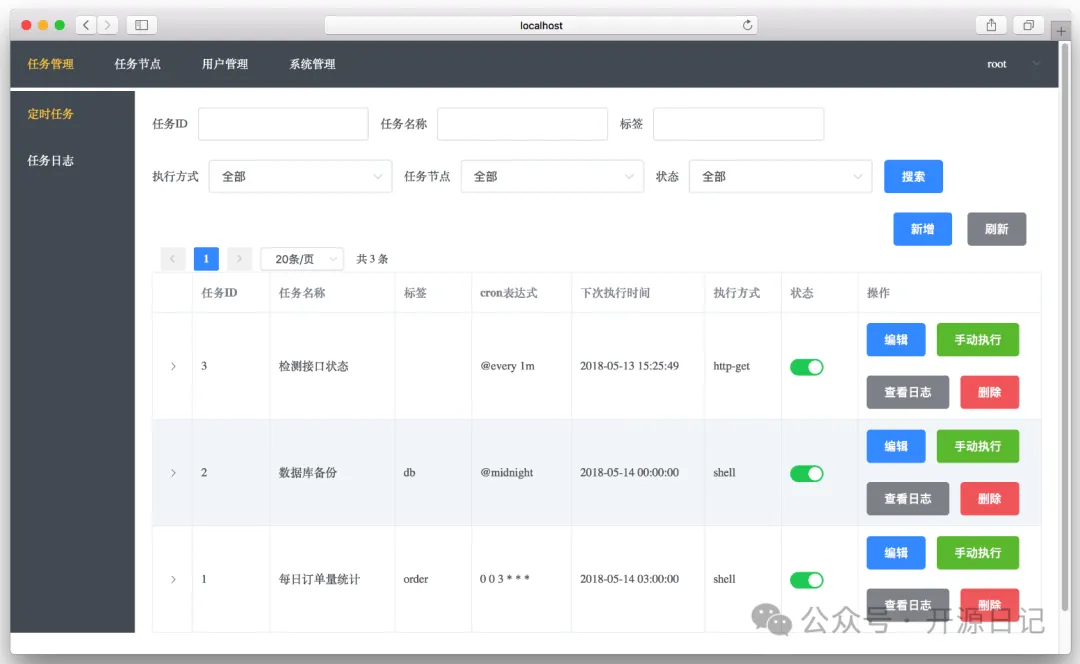目录
- 一、时间戳和日期互相转换
- 二、PHP获取今日、昨日、上周、本周、上月、本月的起始时间戳
- 三、获取当前周的每天的起始时间
- 四、获取周的起始时间
- 五、获取指定日期是周几
- 六、通过某个日期段内的周几获取对应的日期 开始日期 结束日期
- 七、获取指定日期之间的各个周
- 八、获取指定日期之间的各个月
- 九、根据指定日期获取所在月的起始时间和结束时间
- 十、获取指定年份的每个月的起始时间
- 十一、获取指定月份的起止时间戳
一、时间戳和日期互相转换
// 获取时间戳 $date = time(); // 获取当前时间戳 $date = mktime(0, 0, 0, 10, 10, 2020); // 获取指定时间的时间戳 2020年10月10日0时0分0秒 // 日期转换为时间戳 $date = \"2019-08-08 08:08:08\"; $timestamp = strtotime($date); // 将时间戳转换成日期 $date = time(); echo date(\'Y-m-d\', $date); // 输出格式化的日期(年-月-日) // 将时间戳转换为时间格式 $date = time(); echo date(\'H:i:s\', $date); // 输出格式化的时间(小时:分钟:秒) // 日期格式化 $date = time(); echo date(\'Y-m-d H:i:s\', $date); // 输出格式化的日期时间(年-月-日 小时:分钟:秒) // 将时间戳转换为星期 $date = time(); echo date(\'l\', $date); // 输出星期几的完整文本形式(例如:Sunday) // 将时间戳转换为月份 $date = time(); echo date(\'F\', $date); // 输出月份的完整文本形式(例如:January)
二、PHP获取今日、昨日、上周、本周、上月、本月的起始时间戳
//今日开始时间戳和结束时间戳 $beginToday=mktime(0,0,0,date(\'m\'),date(\'d\'),date(\'Y\')); $endToday=mktime(0,0,0,date(\'m\'),date(\'d\')+1,date(\'Y\'))-1; //昨日起始时间戳和结束时间戳 $beginYesterday=mktime(0,0,0,date(\'m\'),date(\'d\')-1,date(\'Y\')); $endYesterday=mktime(0,0,0,date(\'m\'),date(\'d\'),date(\'Y\'))-1; //本周起始时间戳和结束时间戳 $startTime = mktime(0,0,0,date(\'m\'),date(\'d\')-date(\'w\')+1,date(\'y\')); $endTime = mktime(23,59,59,date(\'m\'),date(\'d\')-date(\'w\')+7,date(\'y\')); //上周起始时间戳和结束时间戳 $beginLastweek=mktime(0,0,0,date(\'m\'),date(\'d\')-date(\'w\')+1-7,date(\'Y\')); $endLastweek=mktime(23,59,59,date(\'m\'),date(\'d\')-date(\'w\')+7-7,date(\'Y\')); //本月起始时间戳和结束时间戳 $beginThismonth=mktime(0,0,0,date(\'m\'),1,date(\'Y\')); $endThismonth=mktime(23,59,59,date(\'m\'),date(\'t\'),date(\'Y\')); //上月起始时间戳和结束时间戳 $begin_time = date(\'Y-m-01 00:00:00\',strtotime(\'-1 month\')); $end_time = date(\"Y-m-d 23:59:59\", strtotime(-date(\'d\').\'day\')); //获取当前季度 $season = ceil((date(\'m\'))/3); //本季度起始时间戳和结束时间戳 $starTime=mktime(0, 0, 0,$season*3-3+1,1,date(\'Y\')); $endTime = mktime(23,59,59,$season*3,date(\'t\',mktime(0, 0 , 0,$season*3,1,date(\"Y\"))),date(\'Y\')); //当年起始时间戳和结束时间戳 $startTime = strtotime(date(\"Y\",time()).\"-1\".\"-1\"); $overTime = strtotime(date(\"Y\",time()).\"-12\".\"-31\");
三、获取当前周的每天的起始时间
function getDay(){
$timestr = time(); //当前时间戳
$now_day = date(\'w\',$timestr); //当前是周几
//获取周一
$monday_str = $timestr - ($now_day-1)*60*60*24;
$monday = date(\'Y-m-d\', $monday_str);
//获取周日
$sunday_str = $timestr + (7-$now_day)*60*60*24;
$sunday = date(\'Y-m-d\', $sunday_str);
for($i=0;$i<7;$i++)
{
$arr[$i][\'start\']=strtotime(date(\'Y-m-d\',strtotime($monday.\'+\'.$i.\'day\')));
$arr[$i][\'end\']=strtotime(date(\'Y-m-d\',strtotime($monday.\'+\'.$i.\'day\')). \" 24:00:00\");
}
return $arr;
}
四、获取周的起始时间
1、根据指定时间获取所在周的起始时间和结束时间
/**
* @param data 日期
*/
function get_weekinfo_by_time($date) {
$idx = strftime(\"%u\", strtotime($date));
$mon_idx = $idx - 1;
$sun_idx = $idx - 7;
return array(
\'week_start_day\' => strftime(\'%Y-%m-%d\', strtotime($date) - $mon_idx * 86400),
\'week_end_day\' => strftime(\'%Y-%m-%d\', strtotime($date) - $sun_idx * 86400),
);
}
2、通过时间戳 获取某周的开始时间和结束时间
/**
* @param time 时间
* @param first 表示每周星期一为开始日期 0表示每周日为开始日期
*/
function getWeekMyActionAndEnd($time = \'\', $first = 1)
{
//当前日期
if (!$time) $time = time();
$sdefaultDate = date(\"Y-m-d\", $time);
//$first =1 表示每周星期一为开始日期 0表示每周日为开始日期
//获取当前周的第几天 周日是 0 周一到周六是 1 - 6
$w = date(\'w\', strtotime($sdefaultDate));
//获取本周开始日期,如果$w是0,则表示周日,减去 6 天
$week_start = date(\'Y-m-d\', strtotime(\"$sdefaultDate -\" . ($w ? $w - $first : 6) . \' days\'));
//本周结束日期
$week_end = date(\'Y-m-d\', strtotime(\"$week_start +6 days\"));
return array(\"week_start\" => $week_start, \"week_end\" => $week_end);
}
五、获取指定日期是周几
/**
* @param data 日期
*/
function DateToWeek($date){
//强制转换日期格式
$date_str=date(\'Y-m-d\',strtotime($date));
//封装成数组
$arr=explode(\"-\", $date_str);
//参数赋值
//年
$year=$arr[0];
//月,输出2位整型,不够2位右对齐
$month=sprintf(\'%02d\',$arr[1]);
//日,输出2位整型,不够2位右对齐
$day=sprintf(\'%02d\',$arr[2]);
//时分秒默认赋值为0;
$hour = $minute = $second = 0;
//转换成时间戳
$strap = mktime($hour,$minute,$second,$month,$day,$year);
//获取数字型星期几
$number_wk=date(\"w\",$strap);
//自定义星期数组
$weekArr=array(\"周日\",\"周一\",\"周二\",\"周三\",\"周四\",\"周五\",\"周六\");
//获取数字对应的星期
return $weekArr[$number_wk];
}
六、通过某个日期段内的周几获取对应的日期 开始日期 结束日期
/**
* @param data 日期 array(start_date,end_data)
*/
function getDateByWeek($data)
{
$start_date = strtotime($data[\'start_date\']);
$end_date = strtotime($data[\'end_date\']);
$days = ($end_date - $start_date) / 86400;
$weekArr = array(\'周日\',\'周一\',\'周二\',\'周三\',\'周四\',\'周五\',\'周六\');
$newDate = array();
// 组建数组格式 $dataWeek[\'日期\'] => 星期
for ($i=0; $i < $days; $i++) {
$num_week = date(\'w\',$start_date+($i*86400));
$dateWeek[date(\'Y-m-d\',$start_date+($i*86400))] = $weekArr[$num_week];
}
// 查找两个数组的交集,即获取提交的星期对应的日期
$newDate=array_intersect($dateWeek,$data[\'items\']);
// 获取数组中的键值(日期),并组成一个新数组
$date = array_keys($newDate);
return $date;
}
七、获取指定日期之间的各个周
/**
* @param sdate 开始日期
* @param edate 结束日期
*/
function get_weeks($sdate, $edate) {
$range_arr = array();
// 检查日期有效性
check_date(array($sdate, $edate));
// 计算各个周的起始时间
do {
$weekinfo = get_weekinfo_by_date($sdate);
$end_day = $weekinfo[\'week_end_day\'];
$start = substr_date($weekinfo[\'week_start_day\']);
$end = substr_date($weekinfo[\'week_end_day\']);
$range = \"{$start} ~ {$end}\";
$range_arr[] = $range;
$sdate = date(\'Y-m-d\', strtotime($sdate)+7*86400);
}while($end_day < $edate);
return $range_arr;
}
/**
* 检查日期的有效性 YYYY-mm-dd
* @param array $date_arr
* @return boolean
*/
function check_date($date_arr) {
$invalid_date_arr = array();
foreach ($date_arr as $row) {
$timestamp = strtotime($row);
$standard = date(\'Y-m-d\', $timestamp);
if ($standard != $row) $invalid_date_arr[] = $row;
}
if ( ! empty($invalid_date_arr)) {
die(\"invalid date -> \".print_r($invalid_date_arr, TRUE));
}
}
/**
* 截取日期中的月份和日
* @param string $date
* @return string $date
*/
function substr_date($date) {
if ( ! $date) return FALSE;
return date(\'m-d\', strtotime($date));
}
/**
* 根据指定日期获取所在周的起始时间和结束时间
*/
function get_weekinfo_by_date($date) {
$idx = strftime(\"%u\", strtotime($date));
$mon_idx = $idx - 1;
$sun_idx = $idx - 7;
return array(
\'week_start_day\' => strftime(\'%Y-%m-%d\', strtotime($date) - $mon_idx * 86400),
\'week_end_day\' => strftime(\'%Y-%m-%d\', strtotime($date) - $sun_idx * 86400),
);
}
八、获取指定日期之间的各个月
/**
* @param sdate 开始日期
* @param edate 结束日期
*/
function get_months($sdate, $edate) {
$range_arr = array();
do {
$monthinfo = get_monthinfo_by_date($sdate);
$end_day = $monthinfo[\'month_end_day\'];
$start = substr_date($monthinfo[\'month_start_day\']);
$end = substr_date($monthinfo[\'month_end_day\']);
$range = \"{$start} ~ {$end}\";
$range_arr[] = $range;
$sdate = date(\'Y-m-d\', strtotime($sdate.\'+1 month\'));
}while($end_day < $edate);
return $range_arr;
}
/**
* 截取日期中的月份和日
* @param string $date
* @return string $date
*/
function substr_date($date) {
if ( ! $date) return FALSE;
return date(\'m-d\', strtotime($date));
}
/**
* 根据指定日期获取所在月的起始时间和结束时间
*/
function get_monthinfo_by_date($date){
$ret = array();
$timestamp = strtotime($date);
$mdays = date(\'t\', $timestamp);
return array(
\'month_start_day\' => date(\'Y-m-1\', $timestamp),
\'month_end_day\' => date(\'Y-m-\'.$mdays, $timestamp)
);
}
九、根据指定日期获取所在月的起始时间和结束时间
/**
* @param date 日期
*/
function get_monthinfo_by_date($date){
$ret = array();
$timestamp = strtotime($date);
$mdays = date(\'t\', $timestamp);
return array(
\'month_start_day\' => date(\'Y-m-1\', $timestamp),
\'month_end_day\' => date(\'Y-m-\'.$mdays, $timestamp)
);
}
十、获取指定年份的每个月的起始时间
/**
* @param year 年份
*/
function getMonthByDate($year)
{
// $year = \'2019\';
$yeararr = [];
$month = [];
for ($i=1; $i <=12 ; $i++) {
$yeararr[$i] = $year.\'-\'.$i;
}
foreach ($yeararr as $key => $value) {
$timestamp = strtotime($value );
$start_time = date( \'Y-m-1 00:00:00\', $timestamp );
$mdays = date( \'t\', $timestamp );
$end_time = date( \'Y-m-\' . $mdays . \' 23:59:59\', $timestamp );
$month[$key][\'start_time\'] = strtotime($start_time);
$month[$key][\'end_time\'] = strtotime($end_time);
}
return $month;
}
十一、获取指定月份的起止时间戳
/**
* 获取指定月份的时间戳
* @param $date Y-m
*/
function get_month_begin_end($date){
// $date = \'2018-11\';
$data[\'begin_time\'] = strtotime($date); //指定月份月初时间戳
$data[\'end_time\'] = mktime(23,59,59,date(\'m\',strtotime($date))+1,00); //指定月份月末时间戳
return $data;
}
PHP中的时间戳相关函数非常丰富,可以满足开发者在处理时间相关问题时的各种需求。其中,time()函数可以获取当前时间戳,strtotime()函数可以将字符串转换为时间戳,date()函数可以将时间戳格式化为指定的日期格式。除此之外,还有mktime()函数可以根据指定的时间参数获取时间戳,microtime()函数可以获取当前时间的微秒数等。掌握这些函数可以帮助开发者更加高效地处理时间相关的问题,提高开发效率。
© 版权声明
THE END










暂无评论内容